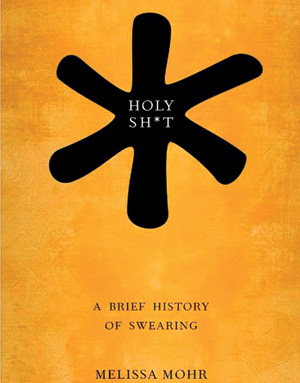
Holy Sh*t: A Brief History of Swearing by Melissa Mohr (OUP)
Swearing is something we do when we are at our most noble and honourable, and when we are at our angriest and least dignified. We do it when in the fullest command of our emotions, and when we lose our tempers entirely. We swear when we stand before the judge and promise to tell the truth, the whole truth, and we might well swear again on being informed that the jury didn’t buy it. It cannot be accidental that we have lit upon the same word for both.
Melissa Mohr certainly thinks not, which is why she has written this wry history of a form of expression both sacred and profane. The title, though bowdlerised, is astutely chosen – indeed, the necessity of that asterisk to placate nervous booksellers is a perfect illustration of the power still wielded by relatively mild curses that would, in this licentious age, scarcely prompt letters to the Daily Mail if deployed during Songs Of Praise.
Mohr’s treatise is a mix of history and human psychology, and an intriguing meditation on how one influences the other. She argues, correctly, that few things define a society more starkly than its taboos. In her epilogue, she considers the stigma only recently – if quite rightly – conferred upon racial epithets in the West, and wonders if those words might, a few centuries hence, have evolved to a point free of their original meaning, and become workaday exclamations along the lines of “fuck”, or “bugger”, or other sexual slang now uttered almost exclusively in non-sexual situations.
Holy Sh*t traces the history of swearing from Ancient Rome to the present day. The Romans, as depicted here, were splendid and vociferous swearers. We have them to thank for, among much else, the Latin word “cunnus”, which has evolved into the English “cunt”, a word that has become an interesting example of the malleability of curses. In Britain, it is a term of abuse directed almost exclusively at men, while in America it serves as an especially high-octane denigration of women. (Similarly, the much-beloved British insult “wanker” has never really translated to the US, which is why it is missing from the book’s singularly glorious index.)
Holy Sh*t detours from Rome via the Bible, and then proceeds through the Middle Ages, the Renaissance, and the 18th and 19th centuries, before arriving in our own era. The bad language changes, but the power of it does not. This, Mohr notes, is something we may never be able to control.
Scientists now believe that we store swear-words in an entirely different part of our brain from our more considered discourse. We swear in the limbic system, our “lower brain”, a murky coagulation of involuntary reflexes. We speak from our cerebral cortex, which is where we (ideally) think before we say things. There will be many readers, especially those still subservient to parents or teachers, who will be grateful for this ready-made excuse for yelling “Fucking cunting bollocks!” next time they stub their toe on something.

